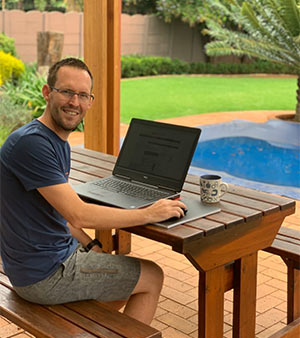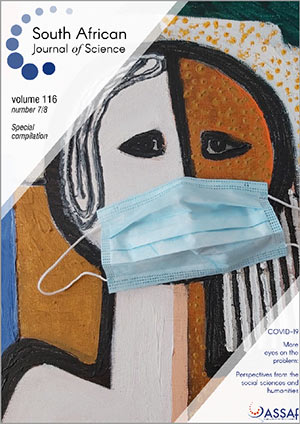
Equipped with state-of-the-art laboratories that provide students with hands-on experiences to bridge theory and practice

Prof David Hedding (Department of Geography, CAES, and lead author of "Covid-19 and the academe in South Africa: Not business as usual", published in the July/August 2020 issue of the South African Journal of Science) working from home during lockdown
Concerns remain about the impact that Covid-19 has had on the higher education sector and research in South Africa. This is better explained in a paper co-authored by different prominent South African researchers, entitled "Covid-19 and the academe in South Africa: Not business as usual", published in the July/August 2020 issue of the South African Journal of Science. Lead author is Unisa’s very own David Hedding, Associate Professor from the Department of Geography in the College of Agriculture and Environmental Sciences (CAES). He believes that the biggest lesson that the education sector has had to learn from Covid-19 disruptions has been the need for agility and flexibility in decision-making.
The severity and diversity of the impacts of Covid-19 inspired the authors to write the informative paper. The paper explains that impacts from the pandemic’s disruptions include those on supervising postgraduate students, meeting research output targets, submitting new grants to secure the next cycle of research, and meeting research funding and project deliverables. From a practical perspective, many research projects will be compromised by lockdown and social distancing regulations.
The most important aspect of the paper addresses the need for the academe in South Africa to think outside the box in terms of facing the challenges presented by the coronavirus, and to be compassionate and mindful that the virus will affect students and staff in various ways. While the paper does not generalise the challenges faced by both staff and students, there will also be funding and productivity implications, which will create a lot of anxiety and affect the mental wellbeing of these stakeholders.
Hedding expressed that the additional pressures placed on staff could result in burnout, as they have to consistently deal with several complex issues over an extended period. Therefore, university management needs to be aware of these issues and place the physical and mental health of staff and students at the forefront of decision-making. Hedding believes that for large organisations to avoid negative impacts on service delivery, they need to respond rapidly to a crisis.
 "Many contact universities were able to switch to online learning within a single semester. Some were more successful than others but, on the whole, tuition in higher education continued across South Africa even in the midst of the pandemic. Unisa is probably best placed to face the challenges presented by Covid-19 but the institution itself was never designed to operate remotely. So even Unisa has had to adapt to the challenges presented by the pandemic."
"Many contact universities were able to switch to online learning within a single semester. Some were more successful than others but, on the whole, tuition in higher education continued across South Africa even in the midst of the pandemic. Unisa is probably best placed to face the challenges presented by Covid-19 but the institution itself was never designed to operate remotely. So even Unisa has had to adapt to the challenges presented by the pandemic."
Hedding added that even though issues remain regarding the connectivity of students, he thinks that higher education across South Africa has demonstrated the ability to embrace online learning. Unisa was able to run an entire examination period remotely and this may mark a shift away from traditional sit-down exams. By so doing, Unisa has practically embraced its values of innovation and excellence, as well as being responsive to student-centredness.
Hedding is aware that Unisa has also put measures in place by providing data to both the staff and students, as well as laptops for staff to perform their duties from home. He acknowledges that working from home can also pose some challenges that cannot be taken for-granted. He urges all university management to put effort in addressing issues relating to mental health as caused by the pandemic.
You can read the paper here.
* By Nancy Legodi, Acting Journalist, Department of Institutional Advancement
Publish date: 2020-08-12 00:00:00.0